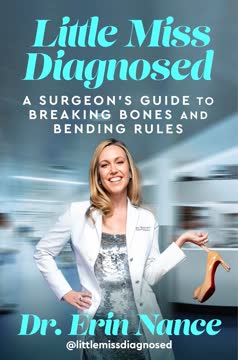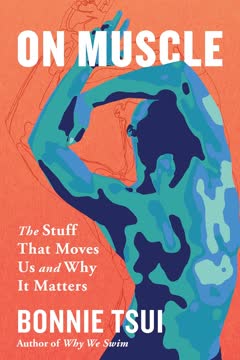Key Takeaways
1. The Grueling Gauntlet of Medical Training
In a sense it’s like an educational Ponzi scheme where we, the people who are voluntarily choosing a career in service to others, have to pay with our money, time, and sanity.
An arduous journey. Becoming a doctor is a multi-decade, financially draining, and intensely competitive process. It demands years of college, rigorous premed courses, extensive research, volunteering, and shadowing, all culminating in the grueling MCAT exam and costly medical school applications.
Unseen sacrifices. This path continues through medical school, residency, and fellowship, requiring hundreds of hours of unpaid labor and constant evaluation. The system, while designed to produce highly skilled professionals, often feels like an "educational Ponzi scheme" due to the immense personal and financial sacrifices demanded at every stage.
2. Resilience Forged Through Personal and Professional Setbacks
One bad test doesn’t mean you don’t get to be a doctor.
Embracing failure. The journey to medicine is fraught with rejections and academic challenges, like the author's multiple rejections from Stanford or a dismal chemistry midterm score. These moments, initially perceived as catastrophic, become crucial lessons in resilience.
Support in adversity. Her mother's simple reassurance that "one bad test doesn’t mean you don’t get to be a doctor" lifted the "veil of perfection," allowing her to persevere. This support, coupled with learning about her father's unfulfilled medical dream, highlighted the importance of both steadfast encouragement and permission to fail.
3. The Indelible Imprint of Mentors and Support Systems
He taught me about the magic in medicine, and I would spend the next thirty years of my life chasing that feeling.
Early inspiration. A childhood broken arm introduced her to Dr. Alexiades, a "bone doctor" who, despite not being on call, came in a tuxedo to treat her. His gentle explanation of a "greenstick fracture" and the body's healing powers ignited her passion, teaching her about the "magic in medicine."
Crucial lifelines. Throughout her training, mentors and colleagues provided essential support. From Dr. Halpern's calm response when her glasses fell onto a patient, turning a mistake into a teaching moment, to her co-resident Alex switching rotations to allow her to care for her paralyzed brother, these "imprints" shaped her into a compassionate and capable physician.
4. Navigating the "Boys' Club" of Surgery
The first rule about Boys’ Club is you do not talk about Boys’ Club.
A male-dominated field. Orthopedic surgery, with only 10% female physicians, often operates like a "Boys' Club" with its own unspoken rules and culture. This includes crude humor, objectification (swimsuit calendars, "dick" cutouts), and inappropriate behavior during professional settings.
Challenging the norm. The author experienced this firsthand, from a chairman asking about her husband's job during an interview to a fellowship director demanding a "dirty joke." While initially tolerating it to "belong," she later, as chief resident, actively dismantled the offensive decor in the ortho lounge, realizing that silence perpetuates such environments.
5. The Unseen Sacrifices of Female Surgeons
You spend your whole young adult life trying desperately to not get pregnant, and then when you feel you are finally ready, every time you see that drop of blood it is a dagger to your heart.
The biological clock. Female surgeons face immense pressure to delay childbearing due to the demanding nature of training, leading to significantly higher rates of infertility. The author witnessed colleagues, like Chief Resident Deb Appleyard, being penalized for having children during residency.
A calculated pregnancy. The author meticulously planned her own pregnancy to coincide with the end of her fellowship, minimizing time off. This involved working long hours while pregnant, double-leading for radiation exposure, and enduring a "cartoon fetus" badge. This experience highlighted the systemic lack of support and the emotional toll of balancing career aspirations with biological realities.
6. When Rules Bend: Ethical Dilemmas in Patient Care
Is it really possible for doctors to remove our own sense of justice to operate within the rigid structures of the system we live in?
The grey areas. Medicine is not always black and white, often forcing doctors to navigate moral ambiguities. The author encountered this when a construction worker, Jorge, refused hand surgery after a severe fall, fearing deportation due to his undocumented status.
Prioritizing humanity. Despite the legal and administrative risks, she chose to book Jorge's emergency surgery as a "John Doe" through a clinic, effectively bypassing the system to save his hand. This act, supported by her attending, underscored the conflict between rigid rules and the Hippocratic Oath, revealing where "humanity lives in the grey."
7. The Profound Humanity of Every Patient Story
The patient and their families are the ones who really know what’s going on.
Beyond the diagnosis. Each patient interaction leaves an "imprint" on a doctor's soul, shaping their practice. From Ms. Weston, whose dying intestines were initially dismissed as post-op pain, to the homeless woman Jeanine, who needed a "white lie" to secure emergency surgery, these stories taught the author to look beyond initial presentations.
Trusting intuition. She learned to believe patients and their families when they sensed something was wrong, even if labs were normal or symptoms seemed atypical. This deepens the doctor-patient relationship, reminding her that doctors only get a small glimpse into a patient's world, and true care requires empathy and trust.
8. Confronting Unconscious Bias and Systemic Flaws
If I’d instead objectively looked at the warning signs that were there all along, I would have checked my biases at the door.
The danger of assumptions. The author's early experience with Ava, a patient with postpartum psychosis, revealed her own unconscious bias. Because Ava "looked normal" and was well-spoken, the author initially dismissed her family's concerns, only to later learn Ava had deteriorated into full-blown schizophrenia after eloping.
Systemic barriers. This incident, coupled with the plight of uninsured patients like Mr. Davidson, who faced a $15,000 bill for rabies shots after a dog bite, exposed the profound flaws in the healthcare system. It highlighted how appearance, socioeconomic status, or legal status can unjustly influence access to care and medical judgment.
9. Finding Your Voice and Standing Up for What's Right
I’m positive this wasn’t the first time someone had said something like that to Jane. But it might have been the first time someone publicly stood up for her.
Courage in conflict. The author learned that sometimes, polite requests are insufficient. When a patient refused care from Dr. Jane, a transgender intern, the author publicly confronted the patient, asserting Jane's competence and demanding respect. This act, though unconventional, was a powerful defense of a colleague facing discrimination.
Leadership in action. Similarly, when a fellow's mistake during surgery threatened a patient's leg, the author defied the hierarchy to alert the attending, prioritizing patient safety over professional courtesy. These moments taught her that true leadership involves knowing when to intervene, speak out, and protect both patients and colleagues.
10. The Best Revenge Is Massive Success: Defining Your Own Path
How it allowed me to build a career around my life, and not my life around my career.
Betrayal and resilience. After being offered a job at her home institution, Lenox Hill, the offer was rescinded while she was pregnant, leaving her jobless. This betrayal, coupled with a sketchy alternative job offer, forced her to redefine success beyond traditional paths.
Forging a new path. Inspired by a colleague, she decided to start her own solo orthopedic surgery private practice, a rarity in modern medicine. This journey, including confronting the hospital that rescinded her offer, allowed her to build a career on her own terms, prioritizing her life and family, and ultimately finding profound satisfaction in her independence.
Last updated:
Review Summary
Little Miss Diagnosed receives overwhelmingly positive reviews, with readers praising Dr. Nance's candid and compassionate approach to medicine. Many appreciate her insights into the challenges faced by women in orthopedic surgery and her advocacy for patient care. Reviewers find her writing style engaging and relatable, comparing her experiences to popular medical dramas. Some highlight her TikTok presence and podcast work. While a few readers found certain parts less engaging, the majority commend Dr. Nance's honesty, humor, and dedication to improving healthcare for women.
Similar Books
Download PDF
Download EPUB
.epub digital book format is ideal for reading ebooks on phones, tablets, and e-readers.












